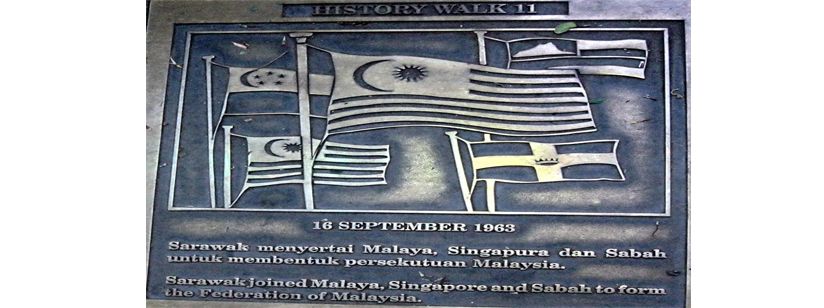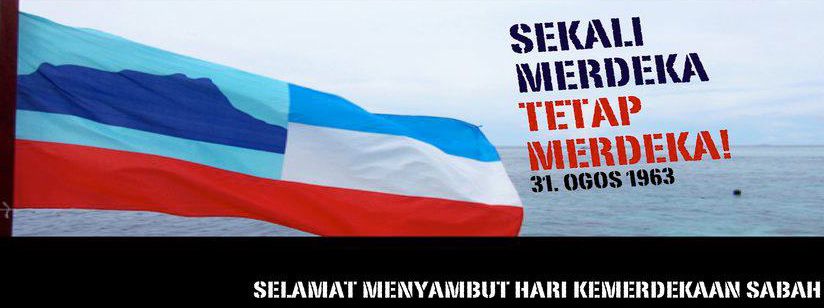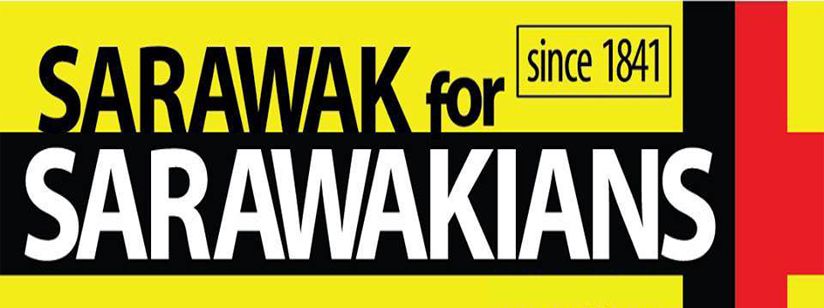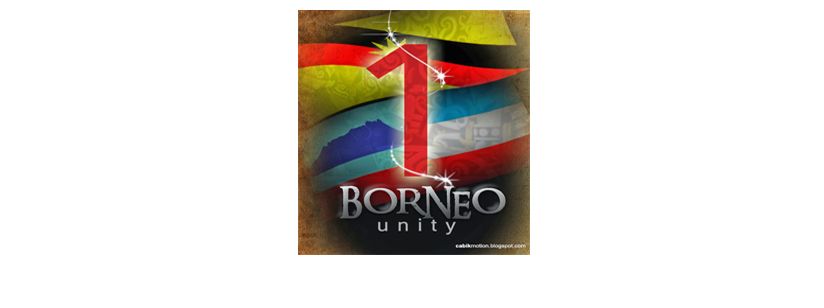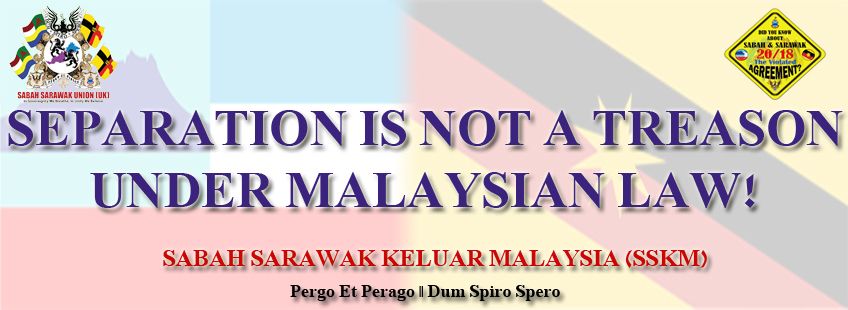 Demikian juga perkara yang sama berlaku di Negara Sabah. Aktiviti Kemerdekaan Negara Sabah telah disambut dengan cara yang sangat unik dan berjaya melakar sejarah baru untuk rujukan dan tatapan generasi masa depan. Ini kerana aktiviti Kemerdekaan dilakukan melalui satu aktiviti yang dipanggil "Ekspedisi Sabah Merdeka Day". Ia disambut oleh semua rakyat Negara Sabah yang berada di tanah air mahupun di luar negara (Negara Sarawak, Negara malaya, Negara Singapura, Negara Taiwan, Eropah-UK). Pada masa yang sama juga, Forum Awam yang memberikan kesedaran telah dianjurkan di kedua-dua negara, Sabah dan Sarawak. Dan yang lebih mengkagumkan, Forum Kesedaran juga telah diadakan di malaya. Ini telah memberi impak kesedaran yang sangat besar sekali.
Demikian juga perkara yang sama berlaku di Negara Sabah. Aktiviti Kemerdekaan Negara Sabah telah disambut dengan cara yang sangat unik dan berjaya melakar sejarah baru untuk rujukan dan tatapan generasi masa depan. Ini kerana aktiviti Kemerdekaan dilakukan melalui satu aktiviti yang dipanggil "Ekspedisi Sabah Merdeka Day". Ia disambut oleh semua rakyat Negara Sabah yang berada di tanah air mahupun di luar negara (Negara Sarawak, Negara malaya, Negara Singapura, Negara Taiwan, Eropah-UK). Pada masa yang sama juga, Forum Awam yang memberikan kesedaran telah dianjurkan di kedua-dua negara, Sabah dan Sarawak. Dan yang lebih mengkagumkan, Forum Kesedaran juga telah diadakan di malaya. Ini telah memberi impak kesedaran yang sangat besar sekali.Friday, 26 September 2014
Friday, September 26, 2014
Agreement of Malaysia
,
Exposing the Truth
,
Fact
,
Federation of Malaysia 16 September 1963
,
Independence
,
Nationalist
,
Sabah Sarawak Union (SSU)
,
Secession
,
Self-Determination
,
Separation
,
SSKM
2
comments
TUNTUT HAK MUTLAK BANGSA NEGARA SABAH DAN BANGSA NEGARA SARAWAK!
Info yang perlu anda tahu... Pada peringkat permulaan pergerakan SSKM, ia adalah dalam bentuk tertutup. Selepas itu bergerak kepada perjumpaan kecil-kecilan di semua tempat Negara Sabah, Negara Sarawak termasuklah di malaya.
Perjumpaan kecil-kecilan SSKM dikenali sebagai "Lepak-lepak SSKM" dan berkembang menjadi besar. Pernah dicadangkan untuk ditukar nama daripada "Lepak-lepak SSKM" kepada "Bornean Gathering (BorGa)".
Namun, apa jua nama panggilannya, perjumpaan dengan rakyat Negara Sabah dan rakyat Negara Sarawak tetap diteruskan malah semakin hari semakin rancak sehinggalah sentimen "Sabah For Sabahan" dan "Sarawak For Sarawakian" muncul semula dan menjadi hangat dan tersangat hangat sekali.
Pemimpin Malaya termasuk barua malaya di Negara Sabah telah menghentam Pejuang Nasionalis Sabahan yang melaungkan slogan "Sabah For Sabahan" tetapi telah dihentam balik dan dipatahkan oleh Pejuang Nasionalis Bangsa Negara Sarawak dengan kenyataan "Kalau bukan Sabah For Sabahan, takkan Sabah For malaya atau PTI?".
Semangat Sarawak For Sarawakian semakin hangat dan kuat kerana kesedaran sejarah dikalangan Generasi Muda Negara Sarawak. Buktinya, penyertaan mereka dapat dilihat melalui penganjuran Hari Kemerdekaan Negara Sarawak pada 22 Julai 2014 telah mendapat sambutan yang sangat HANGAT dan telah menggerunkan malaya untuk terpaksa tunduk kepada Kebangkitan Generasi Muda Negara Sarawak yang mana dikuatkan lagi oleh sokongan pemimpin-pemimpin Nasionalis Negara Sarawak yang berada di barisan Kerajaan mahupun di barisan pembangkang yang menyokong atas kapasiti individu dan tidak mewakili parti politik mereka.
 Demikian juga perkara yang sama berlaku di Negara Sabah. Aktiviti Kemerdekaan Negara Sabah telah disambut dengan cara yang sangat unik dan berjaya melakar sejarah baru untuk rujukan dan tatapan generasi masa depan. Ini kerana aktiviti Kemerdekaan dilakukan melalui satu aktiviti yang dipanggil "Ekspedisi Sabah Merdeka Day". Ia disambut oleh semua rakyat Negara Sabah yang berada di tanah air mahupun di luar negara (Negara Sarawak, Negara malaya, Negara Singapura, Negara Taiwan, Eropah-UK). Pada masa yang sama juga, Forum Awam yang memberikan kesedaran telah dianjurkan di kedua-dua negara, Sabah dan Sarawak. Dan yang lebih mengkagumkan, Forum Kesedaran juga telah diadakan di malaya. Ini telah memberi impak kesedaran yang sangat besar sekali.
Demikian juga perkara yang sama berlaku di Negara Sabah. Aktiviti Kemerdekaan Negara Sabah telah disambut dengan cara yang sangat unik dan berjaya melakar sejarah baru untuk rujukan dan tatapan generasi masa depan. Ini kerana aktiviti Kemerdekaan dilakukan melalui satu aktiviti yang dipanggil "Ekspedisi Sabah Merdeka Day". Ia disambut oleh semua rakyat Negara Sabah yang berada di tanah air mahupun di luar negara (Negara Sarawak, Negara malaya, Negara Singapura, Negara Taiwan, Eropah-UK). Pada masa yang sama juga, Forum Awam yang memberikan kesedaran telah dianjurkan di kedua-dua negara, Sabah dan Sarawak. Dan yang lebih mengkagumkan, Forum Kesedaran juga telah diadakan di malaya. Ini telah memberi impak kesedaran yang sangat besar sekali.
Dan sebaik sahaja semua aktiviti ini selesai, kerajaan telah dengan rasminya memperkenalkan SSKM kepada satu Dunia melalui media rasminya. Ia sebenarnya merupakan satu Penghormatan kepada pihak SSKM untuk berada di kaca TV dan juga disemua surat khabar pada halaman utama muka surat.
Adakah ia menakutkan SSKM?
Ia sebenarnya membuatkan pihak SSKM berasa sangat teruja dan gembira kerana perjuangan SSKM telah mendapat pengiktirafan daripada semua pihak dengan pelbagai gelaran dan tuduhan.
Dan yang lebih membanggakan lagi apabila perdana menteri malaya, ketua polis negara serta kumpulan barisan bn-umno termasuk barisan pr turut serta memberi pengiktirafan melalui media sosial mereka masing-masing.
Siapakah Pencabar/Pihak Lawan Utama SSKM?
Sudah tentu Pencabar/Pihak Lawan SSKM adalah Kerajaan persekutuan tanah melayu (malaya) yang telah menyamar menjadi kerajaan persekutuan malaysia. Maka, orang perseorangan, ngo-ngo yang kecil-kecil yang menjadi suruhan bn-umno-pr sebenarnya bukan lawan sebenar SSKM. Dalam erti kata lain, mereka tidak layak dan tidak setaraf dengan level SSKM.
Cakap besar?
Itu Hak anda untuk sendiri menilai.
Maka dengan itu, pihak SSKM akan menyebarkan secara langsung kepada semua rakyat Bangsa Negara Sabah dan Bangsa Negara Sarawak melalui media sosial SSKM tanpa perlu berselindung lagi. Justeru, pihak SSKM menjemput anda semua untuk menyertai perjuangan ini dengan menyebarkan kesedaran Sejarah berfakta serta Hak-hak yang MESTI DITUNTUT dengan bijaksana melalui saluran Demokrasi dan Bertemadun.
Bukan melalui keganasan, rusuhan, demonstrasi atau apa-apa perbuatan yang mengancam nyawa mahupun keamanan yang bersifat fizikal tetapi perjuangan ini melalui hanya dengan sebatang Pen.
Pen lebih berkesan daripada Peluru.
Petisyen, memorendum dan Referendum merupakan saluran Demokrasi yang diiktiraf oleh Dunia dan ia merupakan pilihan tepat dalam Perjuangan SSKM.
Oleh itu, kenyataan seperti berlaku perang, pertumpahan darah, rusuhan dan sebagainya itu tidak akan berlaku. Walau bagaimanapun, jikalau ia berlaku, ia semestinya didalangi oleh bn-umno termasuklah pr kerana mereka tergugat dan terancam. Ini kerana agenda malaya bakal terkubur dan penjajahan bakal berakhir selamanya di bumi Borneo ini.
Oleh itu, mohon semua untuk sebarkan kesedaran ini kepada semua rakyat Bangsa Negara Sabah dan Bangsa Negara Sarawak untuk tidak terpengaruh dengan mana-mana cubaan yang menggunakan sentimen perkauman dan agama untuk menjejaskan perjuangan SSKM. Ini kerana perjuangan SSKM melangkaui soal agama mahupun perkauman.
Ini soal TUNTUT HAK MUTLAK BANGSA NEGARA SABAH DAN BANGSA NEGARA SARAWAK!
Pergo Et Perago - Dum Spiro Spero
Friday, September 26, 2014
18 Points
,
20 Points
,
Agreement of Malaysia
,
Brunei
,
Exposing the Truth
,
Fact
,
Federation of Malaysia 16 September 1963
,
Jeffrey G.Kitingan
,
North Borneo
,
Sabah
,
Sarawak
,
Singapore
No comments
Damage to Sabah irreversible
KOTA KINABALU: Bingkor Assemblyman Jeffrey Kitingan said Putrajaya was refusing to accept the reality that Sabah lost more than it gained from the Federation of Malaysia and that the damage done was almost irreversible.
Kitingan said Brunei and Singapore were examples for Sabah and Sarawak to move forward.
“It is as though Sabah has never had it so good or any better and that if the state had not joined Malaysia there would be no progress and development, ” said Kitingan, who is also the Star Sabah Chief.
He said these arguments were weak because Sabah was now the second poorest in the Federation, relegating Sarawak to being the poorest.
He also took exception to statements that an independent Sabah would be eaten up by its neighbours or infiltrated by Islamic State (IS) militants bent on taking over the state and creating an Islamic caliphate.
“Putrajaya is in a state of denial. They just refuse to accept the stark reality that Sabah lost more than it gained from the Federation of Malaysia,” he said.
Kitingan said the damage suffered by Sabah and Sabahans was almost irreversible and probably beyond repair.
“The demography has been totally changed with population re-engineering and reverse ethnic-cleansing through Project IC/Mahathir.
“We have lost our political franchise to the illegals on the electoral rolls.
“Is it any wonder that the MNLF and Abu Sayyaf in the southern Philippines are supporting IS militants when our own Prime Minister has called for Umno members to follow the example of the IS militants?” he asked.
Kitingan said the security nightmare in Sabah was a monster created by the Federal government’s covert operations in southern Philippines to train and arm Muslim insurgents, including the MNLF and Abu Sayyaf.
He said all this would be evident if the Royal Commission of Inquiry report was released.
He added that the Federal government could not be trusted with the security of Sabah.
Friday, September 26, 2014
Agreement of Malaysia
,
Federation of Malaysia 16 September 1963
,
malaya
,
Sabah
,
Sarawak
,
Sharing
1 comment
Sabah and Sarawak, better together in Malaysia?
Last Thursday, Scotland voted by a clear margin 55.3% to 44.7% in her independence referendum to affirm the unionists’ vision: Scotland and the rest of the UK are “better together”.
If given a choice, will Sabah and Sarawak say the same, “we and Malaya are better together”?
To me, that perhaps explains the paranoia of some Malayan politicians amid the growing cries for separatism and independence, or even just autonomy, from the other shore of South China Sea.
These politicians simply do not have the confidence that Sabahans and Sarawakians will think they have a better future within Malaysia than if they leave. Perhaps these politicians themselves don’t believe in that possibility.
Marriage – partnership or ownership?
This goes back to a fundamental question: what is a political union, or analogously, a marriage? Is it a partnership of equals, or the ownership of properties?
For some, marriage means a claim of property right on the other party – I own you. You are mine.
Following this logic, marriage is sacred, or more precisely, divorce is a one-way street. I can dump you, I can pass you to another master, but you can never dump me.
And if you dare to talk about divorce, you get grounded or whacked. And no neighbour or stranger should try to stop me from beating you up, because this is our internal affairs.
A civilised alternative to this “ownership” view is “partnership”. We are together because we love each other or we gain from being together. I don’t own you and you don’t own me.
If either of us wants divorce, we should discuss about the future arrangement. We may choose to keep the marriage with a better deal or we may part amicably and sort out how to divide what we have.
I cannot beat you up to force you to stay. Neither can you threaten me with violence to agree to divorce on your terms. Breaking up may be a messy business but violence is not an option to get one’s way.
The seditious idea of self-determination
In the past for almost all countries and it is still the case for many now, the government owns the territories and populations.
The government may cede territory and population to another country but the people can never ask to break away with any territory, either to be independent or join another country.
Because separatism is a cardinal sin, silencing, jailing, torturing and killing separatists are legitimate, in the name of defending “national sovereignty” and “territorial integrity”.
Opposite to the supremacy of national sovereignty is the idea of “self-determination”. Simply put, people should be free to decide whether to be part of a country. Put simply, people have the right of divorce.
In a sense, it “rationalises” international border by forcing governments to keep their population happy.
A country’s territories should be held together only when people living in those territories love each other or benefit from living with each other. If a territory finds itself short-changed by the country it is a part of, it can ask to leave.
Promoted by American president Woodrow Wilson and becoming popular after World War 1, “self-determination” is a deeply seditious idea.
It justified the post-war anti-colonial struggles in many Asian and African territories against their European colonial masters, who ruled to exploit.
What annoys many of these post-colonial countries is that this idea is “colour-blind”.
If Asians or Africans could ask to break away from some European colonial empires on free will, why can’t they do the same from the post-colonial states, even though the new rulers may be of the same colour or creed? Does having the same ancestry or faith make exploitation or tyranny more acceptable?
For example, what moral high ground did Pakistan (then backed by the United States and China) have to keep Bangladesh as its eastern province after committing the worst genocides – including massive rapes – post-World War 2, which claimed some 300,000 to three million lives?
Western imperialist conspiracy?
Some would like to believe that separatism is the evil plot of the US and the West to undermine their rivals and opponents and to restore their imperialist control.
Well, the disintegration of Soviet Union into Russia and 14 smaller independent countries in 1990-1991 could be seen as the greatest separatist operation in history.
A founder of the Non-Aligned Movement, Yugoslavia was broken up into seven states in a long, messy and bloody process from 1991-2008.
Nationalists in China are accusing that the West try to break up China in similar manner by supporting separatism/independence of Tibet, Xinjiang and Taiwan and democracy in Hong Kong.
Two facts stand against this propaganda. Russia is perhaps now the largest and most powerful backer of separatists, all armed to the teeth – not only the jet-shooting rebels in eastern Ukraine, but also the regional warlords in Georgia and Moldavia. More importantly, the West is not spared from the challenge of separatism.
Scotland’s “no” to independence from UK was such a relief to many European countries, from Spain, Belgium, Italy to even France because they have their separatists, too. And despite Scotland’s no, Spain’s Catalonia is now pushing for her own independence referendum.
Competing visions for the future
What is interesting is that the West has found a way – though no guarantee of permanent success – to contain peacefully separatism.
It is not nationalist brain-washing or fabrication of history to create a false sense of common past, but offering a more attractive vision of common future than independent but smaller statehood.
In Scotland’s referendum, possibility and timeline of European Union (EU) membership was a key factor because no Scottish separatists want complete independence even from Brussels.
The European integration project itself in fact is the opposite trend to European separatisms. Until a few years ago, former communist countries in Eastern Europe were keenly lining up to surrender part of their sovereignty to join the club which then promised prosperity.
Separatism is also contained by simply loosening up the existent nation-states. The best example would be Belgium, where some of the more affluent Dutch-speaking population in the north (Flemish) want to ditch their poorer Francophone counterpart in the south (Walloon).
After six rounds of political reforms from 1970 to 2012, the unitary state of Belgium is now innovatively transformed into a federation with not only three regional governments (Flemish, Walloon, Brussels), but also in parallel two community governments (Flemish, Walloon).
Outside of Europe, Canada similarly embarked decentralisation and embraced bilingualism to woo the French-speaking Quebec. The province voted “no” in their independence referendum twice – by 60% in 1980 and narrowly by 51% in 1995 – and the Quebec separatist movement is now at its low point.
Now, with Scotland staying on, UK is virtually federalised as per former prime minister Gordon Brown’s proposed solution to make possible “better together”.
The talk of devolution now even spreads to the south of the Anglo-Scot border.
‘You are mine’ or ‘better together’?
The success of Belgium, Canada and Scotland in peacefully fending off separatist demand tells us that a marriage can be held together by giving each other more space rather than battering the alienated partner.
It is also important to note that when a nation’s future can be decided peacefully, it is the future that matters, not the past.
The Scots did not vote “no” because there was not enough movies like Braveheart or Rob Roy to tell them their ancestors’ plight under the English domination. They did so in the knowledge that Scotland was already free when they got to cast their vote to decide their future.
The referendum, therefore, did not free just Scotland, but also the UK. The UK has become stronger because – whatever one may say about its past – it is now a marriage of freewill.
This is where we can draw the lesson for Malaysia. Many Sarawakians and Sabahans are questioning the legitimacy of Malaysia, even calling September 16 “the Occupation Day”, on the ground that Malaysia was forced into being by the British, Malayan and Singaporean governments.
There was never a referendum to seek the population’s consent.
What will hold or change Malaysia’s international boundary is however not our past, not how this country came into being in 1963, but our future, whether we can be “better together”.
“Bornean separatism” is very much a response to “Malayan imperialism” – the perception or feeling that many Malayans consciously or subconsciously hold that Sabah and Sarawak are “ours”, fuelled by the distorted view that Malaysia is the successor of the Malaccan Sultanate, rather than British Southeast Asia.
To bury “Bornean separatism”, we must first bury “Malayan imperialism”.
Stop thinking that “you are mine”. Start thinking how we can be “better together”.
It’s partnership, not ownership. – September 25, 2014.
